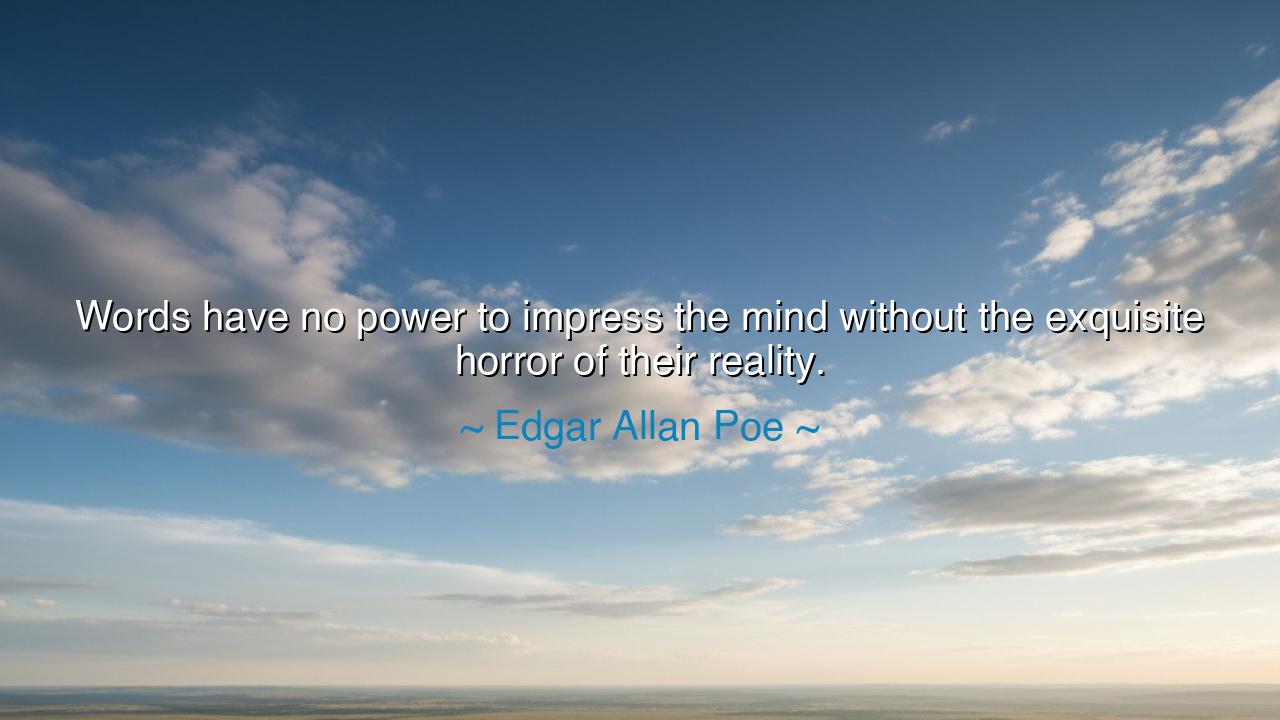
Words have no power to impress the mind without the exquisite






The dark poet Edgar Allan Poe, master of the macabre, revealed a piercing truth when he wrote: “Words have no power to impress the mind without the exquisite horror of their reality.” In this he teaches that words, however elegant or adorned, are hollow unless they are bound to reality. A tale or a speech moves us not by ornament alone, but by the horror, the weight, the sharp edge of truth that lies behind it. Only when language becomes flesh, when it bears the mark of lived experience, does it strike the mind like thunder.
The origin of this saying lies in Poe’s own art, where his stories of terror—madness, death, despair—were not mere inventions, but echoes of the grief and torment he carried in life. Having buried so many he loved, having walked through poverty and despair, Poe knew that horror gives words their power because it awakens recognition in the soul. Fiction without truth is a shadow; but fiction that reflects reality, however dreadful, pierces the heart and cannot be forgotten.
History offers a dreadful parallel in the words of Anne Frank’s Diary. Many had heard of the horrors of Nazi persecution, but her simple words, bound to the stark reality of her confinement, impressed the world more deeply than any report or statistic. Her sentences carried the “exquisite horror” of lived truth, and thus they live on, moving hearts across generations. Like Poe’s insight, her writing proves that words alone cannot awaken the soul unless reality bleeds through them.
The ancients also proclaimed this principle. The tragedians of Greece—Aeschylus, Sophocles, Euripides—did not merely entertain; they gave voice to the anguish of war, exile, betrayal. Their plays endure because they were not abstractions, but mirrors of the real suffering of their people. When the chorus lamented, audiences recognized their own pain, and thus the words burned deeply. Without the horror of reality, the poetry would have been forgotten.
Therefore, O seekers of truth, remember: adorn your speech with beauty if you must, but let it be anchored in reality. For it is not the gilding of words that moves the soul, but the weight of the truth they carry, even if that truth is bitter or filled with horror. Speak and write with honesty, draw from the well of lived experience, and your words will live; but let them float unmoored from reality, and they will vanish like smoke in the wind.






TDThanh Tam Dinh
Poe’s words reflect how literature and language are not just tools of communication but ways to confront reality, no matter how harsh. I wonder, though, if words always have to be tied to this ‘horror’ to be truly powerful. Could it be that by confronting uncomfortable truths, we also change the way we see ourselves and the world around us? Does the reality of something frightening make us more empathetic, or does it just leave us disturbed?
AMAnh My
The concept that words can only impact us if they convey 'horror' is fascinating. It makes me wonder if there’s something inherently human in our need to confront harsh truths in order to fully comprehend them. Is that why literature, especially darker stories, often resonates so deeply with people? Can beauty or positivity, by contrast, be as powerful without the contrast of something darker? This seems to suggest that our most profound emotional responses come from discomfort.
LAlan anh
I find this idea both captivating and unsettling. Poe suggests that the real power of words comes from their ability to evoke fear, discomfort, or a sense of dread. But do we need this kind of intensity for words to truly impact us? Can something as simple as love or kindness hold that same kind of power, or is it only through confronting something terrifying or tragic that words gain their full force?
Llol
This quote strikes me because it highlights how words are not just about their literal meaning but their emotional impact. I agree that there is a certain weight and depth to words when they reflect something we fear or avoid. But can the 'horror' of reality be subjective? Does one person’s horror resonate with everyone, or is it more personal, depending on one’s experiences and perspective? It feels like Poe is talking about confronting the uncomfortable truth.
MNNguyen Manh Nam
Edgar Allan Poe’s quote makes me think about the power of language. Words can be beautiful or compelling, but they only truly resonate when they reflect something deeper, something unsettling or raw about reality. But does that mean every powerful message has to be dark or uncomfortable? Can words alone ever convey the depth of reality without stirring some kind of emotional reaction? I wonder if this also speaks to our connection to discomfort in learning or growing.